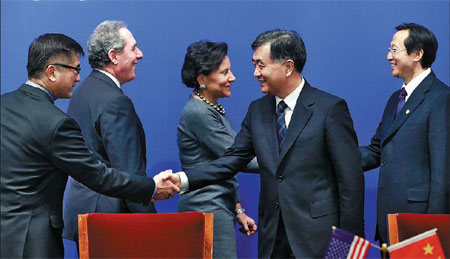US lifts ban on high-tech to China
|
From right: Minister of Agriculture Han Changfu; Vice-Premier Wang Yang; US Secretary of Commerce Penny Pritzker; US Trade Representative Michael Froman; and US Ambassador to China Gary Locke exchange congratulations after signing agreements in Beijing on Friday. Feng Yongbin / China Daily |
The United States said on Friday it will "actively" carry out a plan to lift bans on high-tech exports to China, a long-term irritant in economic ties between the world's two largest economies.
The development is a sign that recent military and trade friction will not deter the two nations from steadily advancing their economic relations, experts said.
Wang Chao, vice-minister of commerce, said the US has agreed to promote high-tech exports to China, especially in civil aviation, information technology and oil and gas exploration for civilian use.
The agreement was reached at annual trade talks between the two countries in Beijing.
Frank Lavin, a former US under secretary of commerce for international trade and founder of Export Now, an enterprise that helps companies sell their products online in China, said the trade talks between China and the US are "a very useful mechanism".
"I participated in the Joint Commission on Commerce and Trade (JCCT) talks over 20 years ago," Lavin said Saturday in an e-mail to China Daily. "These are the two largest economies in the world, and they have different histories, levels of development and political systems. An ongoing dialogue is the best way to try to shape a convergence of views on trade."
In 2011, the two countries signed a plan covering US technology exports to China as well as an agreement on its implementation, but experts said Beijing and Washington have made little progress in boosting high-tech trade.
Wang said the US restrictions on technology exports are a major reason for the trade deficit between the two countries.
"It is beneficial for both countries to reach consensus on the issue," Wang said. "Technological products from the US accounted for about 18 percent of China's total technology imports nearly a decade ago, but now this stands at 7 percent."
Niu Jun, a professor at the School of International Studies at Peking University, said the US move is a tentative step forward.
"The US has shown its sincerity to some extent, but it is difficult to draw a clear line between civilian and military purposes, as many technologies and products can be used both ways," Niu said. "US concerns over the exports are still huge."
The two countries also signed a memorandum on energy cooperation on Friday, but no further details on that have been disclosed.
Lin Boqiang, director of the China Center for Energy Economic Research at Xiamen University, said China urgently needs shale gas exploration technology from the US.
"It also needs US technology in the clean-energy sector, such as the use of wind, solar and nuclear power," he added.
This year's session of the China-US JCCT, the first high-level trade talks between the countries since President Xi Jinping took office in March, was held amid tensions between their navies and as China rejected hundreds of thousands of tons of US genetically modified corn.
On Friday, China said it has rejected US corn shipments - totaling close to 600,000 metric tons - tainted with a genetically modified strain not approved by Beijing. MIR162, the genetically modified organism (GMO) in question, is a variety of insect-resistant corn.
But Niu, from Peking University, dismissed speculation that Sino-US relations may cool, saying the two sides are "moving toward the right direction, with minor conflicts".
"Some are pessimistic about the relationship, because it has gone through many ups and downs in recent years," Niu said. "But I think it is one of the most durable among big powers, because of high interdependence."
However, Lavin, of Export Now, cautions that progress in trade talks between China and the US may not come instantly.
"The leadership of both countries is committed to progress on trade," Lavin said. "Only when each side understands the other side's perspective can both countries start to move to solutions. Each country has concerns about moving too fast, so it is reasonable to expect a step-by-step approach."
Contactthewritersat zhaoyinan@chinadaily.com.cn, dujuan@chinadaily.com.cn and jackfreifelder@chinadailyusa.com



















